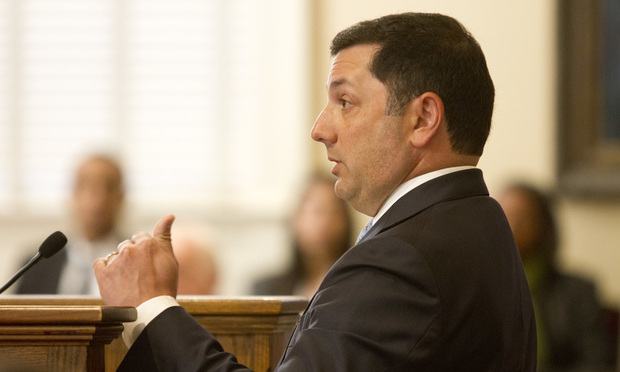Lawyers Argue Over Gag Order in Beauty Queen Murder Trial
A First Amendment lawyer and a public defender argued before the Georgia Supreme Court Tuesday over restrictions on statements by lawyers and police…
October 24, 2017 at 05:53 PM
10 minute read
 Derek Bauer, Baker Hostetler, Atlanta (Photo: John Disney/ ALM)
Derek Bauer, Baker Hostetler, Atlanta (Photo: John Disney/ ALM) A First Amendment lawyer and a public defender argued before the Georgia Supreme Court Tuesday over restrictions on statements by lawyers and police surrounding the trial of a man accused of murdering a beauty queen in the one-stoplight farm town of Ocilla 200 miles south of Atlanta. “We're here today because of that rarest of judicial remedies—a gag order,” said S. Derek Bauer of Baker & Hostetler, representing WXIA 11 Alive TV in Atlanta and WXIA TV in Macon.
While the U.S. Supreme Court has always “left open the possibility” of the need to restrict communications to protect the right to a fair trial, it was always meant as a “remedy of last resort,” Bauer said.
Bauer told the court that Irwin County Superior Court Judge Melanie Cross did not show on the record any consideration of other options for ensuring a fair trial for Ryan Duke, accused of killing high school history teacher, Miss Tifton and Miss Georgia contestant Tara Grinstead 12 years ago.
One Saturday in 2005, after helping out at the Miss Georgia Sweet Potato Pageant and attending a cookout at the family home of a former school superintendent, she went back to her neat, white wood frame house and was never seen again. Police came looking when she didn't show up at the Irwin County High School the following Monday. They found the clothes she wore to the cookout, but not her—despite searching the woods, draining a pond and calling into question every one of her suitors.
When police finally made an arrest this year, Bauer noted they thanked “the media,” noting that news coverage led to the tip that pointed to the defendant, accused of killing her during a burglary and hiding her body.
Reporters, bloggers and cameras descended on the courthouse in what the judge called a “feeding frenzy.” She issued an order in February restricting all communication about the case. After a hearing, the judge modified the gag order to affect lawyers and law enforcement professionals, including those who have retired from duty.
“Protection from prior restraint is a primary guarantee of the Constitution,” Bauer told the court during a special session at the University of Georgia law school in Athens. “Our way of life doesn't allow the government to say you cannot speak on these topics.”
Several justices asked Bauer what they can tell the judge to do to ensure a fair trial short of a gag order. “There are lots of arrows in the quiver,” Bauer said. “Strong voir dire. Change of venue. The passage of time.”
Public defender Michael Gowen told the court that he and his boss, Circuit Public Defender John Mobley, asked the judge for the gag order as a precaution to ensure their client a fair trial.
“You normally need at least some evidence of bad stuff happening before you can restrain people,” Justice David Nahmias told Gowen. “A lot of the pieces of evidence you cite are examples of law enforcement refusing to comment.”
“That's right,” Gowen replied.
“What authority do you have for stopping it before it happens?” Namias asked.
“The court is not all-knowing,” Gowen answered. Then he went on to talk about the nationally televised O.J. Simpson murder trial in Los Angeles, but agreed with Nahmias that that it was very different than the proceedings in Ocilla.
On further questioning, Gowen said he objected to published photographs of his client in shackles and a prison jump suit. And he was disturbed by hateful social media posts.
“You can't stop that,” said Nahmias. “Maybe you need to sift it out in voir dire or a change of venue.”
The case is WXIA-TV v. State of Georgia, No. S17A1804.
 Derek Bauer,
Derek Bauer, A First Amendment lawyer and a public defender argued before the Georgia Supreme Court Tuesday over restrictions on statements by lawyers and police surrounding the trial of a man accused of murdering a beauty queen in the one-stoplight farm town of Ocilla 200 miles south of Atlanta. “We're here today because of that rarest of judicial remedies—a gag order,” said S. Derek Bauer of
While the U.S. Supreme Court has always “left open the possibility” of the need to restrict communications to protect the right to a fair trial, it was always meant as a “remedy of last resort,” Bauer said.
Bauer told the court that Irwin County Superior Court Judge Melanie Cross did not show on the record any consideration of other options for ensuring a fair trial for Ryan Duke, accused of killing high school history teacher, Miss Tifton and Miss Georgia contestant Tara Grinstead 12 years ago.
One Saturday in 2005, after helping out at the Miss Georgia Sweet Potato Pageant and attending a cookout at the family home of a former school superintendent, she went back to her neat, white wood frame house and was never seen again. Police came looking when she didn't show up at the Irwin County High School the following Monday. They found the clothes she wore to the cookout, but not her—despite searching the woods, draining a pond and calling into question every one of her suitors.
When police finally made an arrest this year, Bauer noted they thanked “the media,” noting that news coverage led to the tip that pointed to the defendant, accused of killing her during a burglary and hiding her body.
Reporters, bloggers and cameras descended on the courthouse in what the judge called a “feeding frenzy.” She issued an order in February restricting all communication about the case. After a hearing, the judge modified the gag order to affect lawyers and law enforcement professionals, including those who have retired from duty.
“Protection from prior restraint is a primary guarantee of the Constitution,” Bauer told the court during a special session at the University of Georgia law school in Athens. “Our way of life doesn't allow the government to say you cannot speak on these topics.”
Several justices asked Bauer what they can tell the judge to do to ensure a fair trial short of a gag order. “There are lots of arrows in the quiver,” Bauer said. “Strong voir dire. Change of venue. The passage of time.”
Public defender Michael Gowen told the court that he and his boss, Circuit Public Defender John Mobley, asked the judge for the gag order as a precaution to ensure their client a fair trial.
“You normally need at least some evidence of bad stuff happening before you can restrain people,” Justice David Nahmias told Gowen. “A lot of the pieces of evidence you cite are examples of law enforcement refusing to comment.”
“That's right,” Gowen replied.
“What authority do you have for stopping it before it happens?” Namias asked.
“The court is not all-knowing,” Gowen answered. Then he went on to talk about the nationally televised O.J. Simpson murder trial in Los Angeles, but agreed with Nahmias that that it was very different than the proceedings in Ocilla.
On further questioning, Gowen said he objected to published photographs of his client in shackles and a prison jump suit. And he was disturbed by hateful social media posts.
“You can't stop that,” said Nahmias. “Maybe you need to sift it out in voir dire or a change of venue.”
The case is WXIA-TV v. State of Georgia, No. S17A1804.
This content has been archived. It is available through our partners, LexisNexis® and Bloomberg Law.
To view this content, please continue to their sites.
Not a Lexis Subscriber?
Subscribe Now
Not a Bloomberg Law Subscriber?
Subscribe Now
NOT FOR REPRINT
© 2025 ALM Global, LLC, All Rights Reserved. Request academic re-use from www.copyright.com. All other uses, submit a request to [email protected]. For more information visit Asset & Logo Licensing.
You Might Like
View All

Supreme Court May Limit Federal Prosecutions Over 'Misleading' but True Statements

Venezuelan Man Convicted in Laken Riley's Killing Asks for a New Trial
2 minute read
Trending Stories
- 1New York-Based Skadden Team Joins White & Case Group in Mexico City for Citigroup Demerger
- 2No Two Wildfires Alike: Lawyers Take Different Legal Strategies in California
- 3Poop-Themed Dog Toy OK as Parody, but Still Tarnished Jack Daniel’s Brand, Court Says
- 4Meet the New President of NY's Association of Trial Court Jurists
- 5Lawyers' Phones Are Ringing: What Should Employers Do If ICE Raids Their Business?
Who Got The Work
J. Brugh Lower of Gibbons has entered an appearance for industrial equipment supplier Devco Corporation in a pending trademark infringement lawsuit. The suit, accusing the defendant of selling knock-off Graco products, was filed Dec. 18 in New Jersey District Court by Rivkin Radler on behalf of Graco Inc. and Graco Minnesota. The case, assigned to U.S. District Judge Zahid N. Quraishi, is 3:24-cv-11294, Graco Inc. et al v. Devco Corporation.
Who Got The Work
Rebecca Maller-Stein and Kent A. Yalowitz of Arnold & Porter Kaye Scholer have entered their appearances for Hanaco Venture Capital and its executives, Lior Prosor and David Frankel, in a pending securities lawsuit. The action, filed on Dec. 24 in New York Southern District Court by Zell, Aron & Co. on behalf of Goldeneye Advisors, accuses the defendants of negligently and fraudulently managing the plaintiff's $1 million investment. The case, assigned to U.S. District Judge Vernon S. Broderick, is 1:24-cv-09918, Goldeneye Advisors, LLC v. Hanaco Venture Capital, Ltd. et al.
Who Got The Work
Attorneys from A&O Shearman has stepped in as defense counsel for Toronto-Dominion Bank and other defendants in a pending securities class action. The suit, filed Dec. 11 in New York Southern District Court by Bleichmar Fonti & Auld, accuses the defendants of concealing the bank's 'pervasive' deficiencies in regards to its compliance with the Bank Secrecy Act and the quality of its anti-money laundering controls. The case, assigned to U.S. District Judge Arun Subramanian, is 1:24-cv-09445, Gonzalez v. The Toronto-Dominion Bank et al.
Who Got The Work
Crown Castle International, a Pennsylvania company providing shared communications infrastructure, has turned to Luke D. Wolf of Gordon Rees Scully Mansukhani to fend off a pending breach-of-contract lawsuit. The court action, filed Nov. 25 in Michigan Eastern District Court by Hooper Hathaway PC on behalf of The Town Residences LLC, accuses Crown Castle of failing to transfer approximately $30,000 in utility payments from T-Mobile in breach of a roof-top lease and assignment agreement. The case, assigned to U.S. District Judge Susan K. Declercq, is 2:24-cv-13131, The Town Residences LLC v. T-Mobile US, Inc. et al.
Who Got The Work
Wilfred P. Coronato and Daniel M. Schwartz of McCarter & English have stepped in as defense counsel to Electrolux Home Products Inc. in a pending product liability lawsuit. The court action, filed Nov. 26 in New York Eastern District Court by Poulos Lopiccolo PC and Nagel Rice LLP on behalf of David Stern, alleges that the defendant's refrigerators’ drawers and shelving repeatedly break and fall apart within months after purchase. The case, assigned to U.S. District Judge Joan M. Azrack, is 2:24-cv-08204, Stern v. Electrolux Home Products, Inc.
Featured Firms
Law Offices of Gary Martin Hays & Associates, P.C.
(470) 294-1674
Law Offices of Mark E. Salomone
(857) 444-6468
Smith & Hassler
(713) 739-1250






